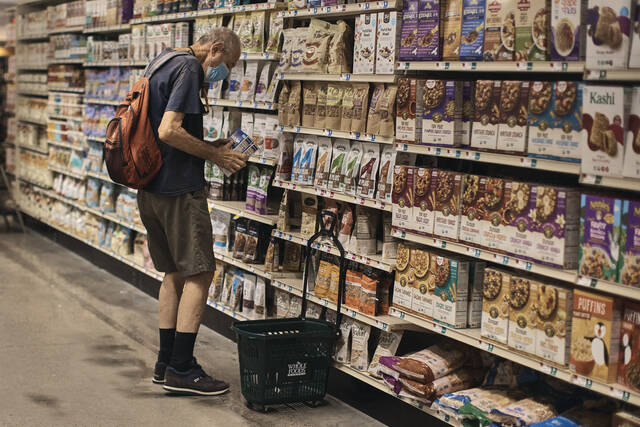You don’t have to tell Kevin McCallister there’s something wrong with the economy.
“I’m just trying to stay under the radar as far as raising prices,” said McCallister, owner of Kevin’s Deli in Pittsburgh’s Oakland neighborhood.
While businesses often raise prices every year, many small businesses have been raising prices every month to afford materials, pay employees and make a profit.
McCallister is able to keep his prices in check, he said, because he runs the deli by himself, but restaurants nationwide have had to make frequent adjustments to items and/or prices on their menus.
Many are calling it a recession, but is it?
Not necessarily, experts said.
Interest rates are climbing. Inflation is at a 40-year high, and the nation’s gross domestic product (GDP) has shrunk for two consecutive quarters.
Normally, that would mean the economy is in a recession. But like almost everything since 2020, this economic slowdown isn’t “normal.”
That’s because, economists say, the country has low unemployment, many industries are reporting record profits, and consumer spending is buzzing despite higher consumer prices.
“There’s softness in the economy; there is not a retraction,” said Gus Faucher, chief economist for PNC Financial Services Group.
He noted that the nonpartisan National Bureau of Economic Research does not categorize the economy’s slowdown as a recession. “The economy is in an OK place but not in a great place,” Faucher said.
University of Pittsburgh professor Stefania Albanesi, an expert in macroeconomics, public economics and labor economics, said although the current rate of inflation is a bad sign, the economy is not in a recession — at least not yet.
Albanesi defined a recession as “a situation where there is a broad set of macroeconomic variables that are growing backwards.” That can involve, among other things, a decline in the GDP, investments and spending.
Exacerbating the situation is Russia’s war in Ukraine, the covid-19 pandemic, shipping costs and a decrease in workers in certain sectors of the economy, Albanesi said.
“On top of that, we have inflation,” she said. “Inflation is mostly a function of a supply chain issue.”
Faucher said higher consumer costs make “people feel that they are falling behind.”
‘What can I do?’
Theresa Stitt, owner of Embroidery From the Heart in Oakmont, said prices for the apparel she buys increased by a dollar.
“It may not seem like a lot,” she said, “but it is.”
She has managed to pass increased costs for shipping and materials on to customers, and she said she is lucky to have three part-time employees willing to go the extra mile.
In Greensburg, Greg and Christina Cammerata are changing menu prices at IronRock Tap House every week.
“We’re spending significantly more to put out the same dishes before inflation happened,” Greg Cammerata said. “It’s a shame because you see people come in, and they’re like, ‘Oh my gosh, this place is so expensive.’ But what they don’t realize is you’re actually making zero money.
“You hope that the consumers understand what’s going on.”
More on the economy:
• Explainer: How do we know when a recession has begun?• D. Brian Blank: Is the U.S. in a recession? Well, that depends on whom you ask — and what measure they use
• U.S. economy's mixed signals — here's what it all means
Cammerata said businesses also must spend more money to keep employees.
McCallister and the Cammeratas said they have suffered losses because of heightened expenses and a decline in customers since the pandemic struck.
“Right now, this building is empty,” McCallister said, noting he is located in an office building on the University of Pittsburgh’s campus. “That’s hurting me more than anything else.”
Cammerata said he has noticed fewer customers since gas prices skyrocketed.
“People have less disposable income to come out and eat,” he said.
Business owners said they have less disposable income, as well.
Cammerata said the profit margins at his restaurant have decreased dramatically. He said he and his wife are fortunate that IronRock is not their primary source of income.
McCallister said profit margins also have thinned for Kevin’s Deli because of a spike in the cost of ingredients.
The price he pays for the same box of chicken wings went from $37 to $61 to $94 over the span of three months. Most other goods have become more expensive, as well, he said.
To compensate, McCallister said, he is using his credit cards to cover costs.
“I’m using more credit than I ever used in my life,” he said. “Interest is killing me, but what can I do?”
What’s ahead?
Faucher said the job market is strong and unemployment is at 3.6%, so “I don’t think there is a need to panic — parts of the economy are holding up well.”
It’s a good time to be looking for a job, he said.
Albanesi said increased interest rates may hurt people who are looking to buy houses and businesses that have capital loans with variable interest rates.
For people with low credit scores, obtaining a credit card might become nearly impossible, she said.
“I expect more of a tightening of credit limit,” Albanesi said.
Inflation is still a worry, Faucher said, but he expects it to slow and linger for the next year or two.
“I do think inflation will return to levels before the pandemic,” he said.








